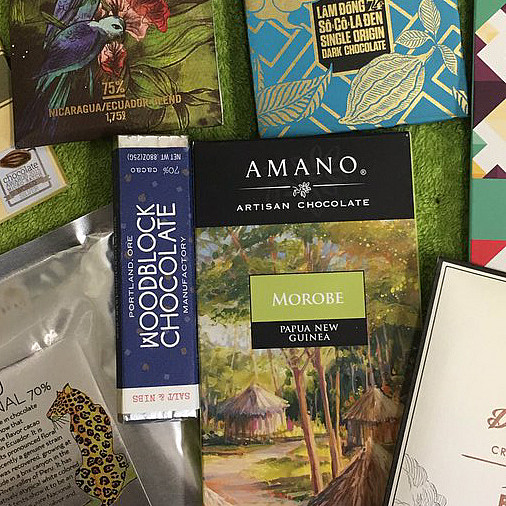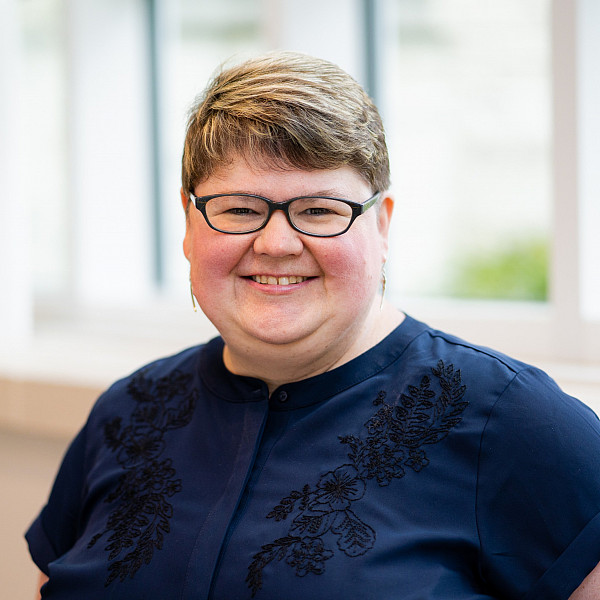News
The Sweet Side of Science
Professor of biology shares her passion for chocolate education.
July 07, 2023
July 07, 2023
Open gallery

Romi Burks is not your average biology professor. While deeply knowledgeable about aquatic ecology, focusing her research on the molecular ecology of freshwater snails, her true passion for lifelong learning immerses her in the professional world of chocolate. Driven by a fascination for the ordinary yet misunderstood entity, Burks continues to build her reputation as an authority in chocolate education.
Firmly advocating that chocolate speaks to every discipline, Burks has transformed her classroom into a chocolate paradise. In her 20 years at Southwestern, she has taught a first-year seminar class titled Does Chocolate Have a Dark Side and a biology course, The Science of Chocolate. Her lectures and hands-on class projects are an immersive experience where students delve into the biology of the cacao tree, the intricate process of chocolate production, and the scientific wonders that give chocolate its unique flavors.
As an ecologist, Burks believes in the interconnectedness of all things. Drawing inspiration from Southwestern’s Paideia philosophy, she encourages her students to explore the depths of this fundamental principle. While some connections may not always be obvious, she urges students to think deeper and question their preconceived notions. Over time, this develops a student’s ability to establish links between different subjects.
“I want students to question their assumptions about something so ubiquitous and mainstream to understand the process of how chocolate comes to be,” Burks said. “It’s much more labor-intensive than many other specialty-type foods, so knowing where your chocolate comes from is equally important. It’s easy to expand beyond the science by asking someone if they can trace where those beans originated, knowing that someone got fairly paid. I think examining our assumptions, value system, and ethics are equally important to understanding the science.”
Beyond the classroom, Burks’ impact as a chocolate educator extends far and wide. She travels extensively, immersing herself in the rich culture of chocolate-producing regions, acting as a judge for the International Chocolate Awards and the Academy of Chocolate (UK), and sharing her knowledge with a wide audience. Through workshops, conferences, and public speaking engagements, she captivates students and chocolate enthusiasts, leaving them with an appreciation for the intricate world of chocolate. Recently, she took on a leadership role in steering the Fine Chocolate Glossary and the Fine Chocolate Industry Association to help foster efforts to speak the same language across various stakeholders.
Burks is dedicated to educating the public about the often-unseen labor of chocolate production and promoting scientific literacy by using chocolate as an example. By bridging the gap between consumers and those who work behind the scenes, she illuminates the hardships farmers, laborers, and artisans face in pursuing exceptional chocolate. Emphasizing the significance of ethical practices and sustainable farming, she seeks to instill an appreciation for the human labor found in every chocolate bar. Burks wants to inspire consumers to make conscious choices that positively impact the lives of those involved in creating chocolate, fostering a more equitable and sustainable industry.
“Chocolate only grows in the equatorial belt of the globe. It takes three to five years for a tree to bear fruit and about six months to make a pod. The flowers are only open to be pollinated for about 48 hours, and less than 1% of them actually get pollinated,” Burks explained. “It’s all hand harvested, gets fermented for around a week, and then dried for up to another week. Next, it’s packed and generally shipped to a manufacturer that turns it into chocolate which usually does not take place in the country of origin where the trees grow. So, whether a cheap, mass-market candy bar or a carefully crafted bar, chocolate has a global footprint and traveled a long way to get to you. It seems like a miracle to me that we have chocolate at all.”
Expressing gratitude for her teaching experience at a liberal arts institution, Burks appreciates the opportunities provided by Southwestern to pursue and enhance her academic interests. She has delved into the world of chocolate and integrated it into her courses. However, this is an ongoing journey. Burks is preparing for an upcoming year-long sabbatical, affectionately named “The Year of Chocolate.” During this time, she wants to write a comprehensive book that explains what different areas of the industry entail. Burks hopes to inspire people to learn about chocolate cultivation, the creation process, what makes exceptional chocolate, and the legacy of the world of fine chocolate. Fueled by her unwavering passion for education and chocolate, she invites others to explore the resources she has on her website. There is a wealth of information, from fine chocolate recommendations to presentations.
For those hungry for more knowledge about the process of making chocolate or an understanding of how it reaches us, many resources exist. Burks recommends Craft Chocolate TV, a series of videos produced by the makers of Manoa Chocolate, which educates on the art and process of bean-to-bar chocolate making. She also has high praise for the podcast The Slow Melt, which uses chocolate as the lens through which to explore the world.
Help support our world-class faculty like Romi by making a gift to Southwestern.


















